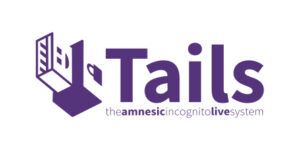Tails will take you through a den of identity thieves, who will never learn your name. It’s sorta the opposite of Cheers.

Tails — also known as “The Amnesic Incognito Live System” — just skipped version 6.14 and went straight to 6.14.1.
“Today, we are releasing 6.14.1 instead of 6.14 because we discovered an important issue while testing 6.14 on Tuesday and had to start the release process again to fix it,” the project said in last week’s announcement of the release.
You know the saying: If at first you don’t succeed, try try again.
Tails is a Debian-based live DVD/USB providing complete internet anonymity for the user. All of its internet apps, from its default browser to its IRC client, mail client, and instant messenger, are all preconfigured with security in mind and with all traffic virtually anonymous. To achieve this it uses the Tor network, which makes internet traffic hard to trace.
Although this means it defaults to the Tor Browser, it also includes a “regular” browser for those sites that won’t accept traffic from Tor. It calls this browser Unsafe Browser, and Tails devs go out of their way to make it difficult for users to open it by mistake.
Not surprisingly, most of their attention is on the default browser, however.
“We improved the confinement technology that we use to protect your files from possible security vulnerabilities in Tor Browser,” the project stated in its announcement. “Until now, Tor Browser could only save downloads to and read files from a limited number of folders. With Tails 6.14.1, you can safely access any folder in your Home folder or Persistent Storage from Tor Browser.”
The new release fixes other issues as well:
“This new integration also solves other usability and accessibility issues:
- The Large Text accessibility feature works in Tor Browser.
- The Cursor Size accessibility feature works in Tor Browser.
- The minimize and maximize buttons are available again in the title bar.
These improvements rely on two security technologies: the flexibility of the new XDG Desktop Portals of Flatpak allowed us to relax the AppArmor confinement, improving usability without compromising on security.”
Tails Is Closer to Tor Than Ever
Tails officially became part of the Tor Project in September, which only makes sense since the distro is basically Tor with bells and whistles — and an underlying, privacy-focused operating system.
While the Tor Project became a 501(c)(3) nonprofit in 2006, the idea of “onion routing” began in the mid 1990s.
According to Wikipedia, “onion routing” is a technique for anonymous communication over a computer network. “Messages are encapsulated in layers of encryption, analogous to the layers of an onion. The encrypted data is transmitted through a series of network nodes called ‘onion routers,’ each of which ‘peels’ away a single layer, revealing the data’s next destination.”
In the early 2000s Roger Dingledine, then a recent MIT graduate, began working on an NRL onion routing project with Paul Syverson. To distinguish this original work at NRL from other onion routing efforts that were starting to pop up elsewhere, Dingledine called the project Tor, which stood for The Onion Router.
The Electronic Frontier Foundation recognized the benefit of Tor to digital rights and began funding Tor in 2004, and in 2006, the Tor Project was founded with nonprofit status to maintain Tor’s development.
Tor began gaining popularity among activists and tech-savvy users interested in privacy, but it was still difficult for less-technically savvy people to use, so starting in 2005, development of tools beyond just the Tor proxy began. Development of Tor Browser began in 2008.
Tor and the Arab Spring
With Tor Browser having made Tor more accessible to everyday internet users and activists, Tor was an instrumental tool during the Arab Spring beginning in late 2010. It not only protected people’s identity online but also allowed them to access critical resources, social media, and websites which were blocked.
People’s awareness of tracking, surveillance, and censorship may have increased, but so has the prevalence of these hindrances to internet freedom. Today, the network has thousands of relays run by volunteers and millions of users worldwide. And it is this diversity that keeps Tor users safe.
“But Tor is more than just software,” the Tor web page says. “It is a labor of love produced by an international community of people devoted to human rights. The Tor Project is deeply committed to transparency and the safety of its users.”







